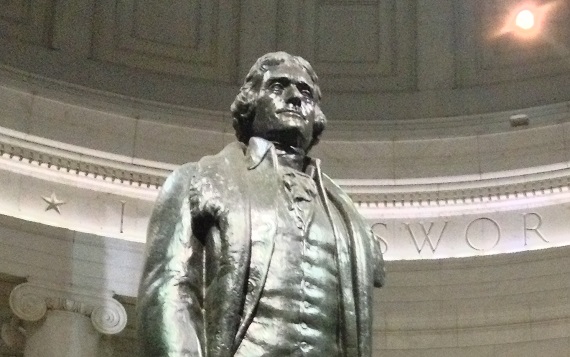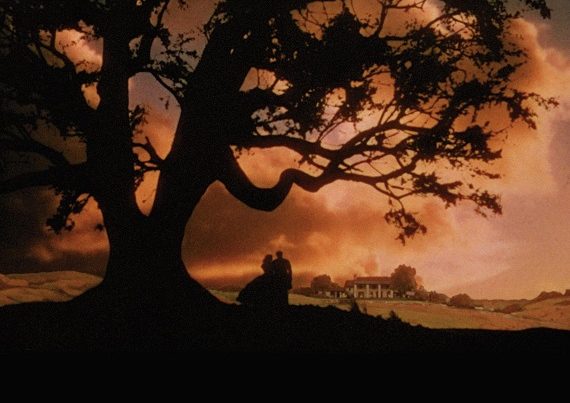In recent years, Thomas Jefferson, father of University of Virginia and first citizen of Charlottesville, has been the target of vitriolic assaults from countless persons, scholars among them, and groups in America. What is most surprising is that many of the assaults today come from persons or groups in or around his hometown, Charlottesville, where, one might expect, the citizens would be especially loath to vilipend Jefferson.
Yet the city of Charlottesville itself, where UVa is situated, has also come to contemn Jefferson. Contemning Jefferson is today in vogue, because racism is in vogue. And so, Charlottesville has announced that it will not be celebrating the birthday of Thomas Jefferson (April 13)—City Council voted four to one in June 2019—for the first time since World War II. It has chosen Jefferson’s birthday to celebrate a new holiday—“Liberation and Freedom Day,” in honor of the liberation of 14,000 slaves that occurred on March 3, 1865, when the city’s officials then formally surrendered to Union troops. Though Liberation and Freedom Day has been celebrated for several years, City Council of Charlottesville has decided to change the day of its celebration to Jefferson’s birthday in an effort to make a louder statement. It is not difficult to ascertain that political statement.
Professor Jalane “Smash the Fash” Schmidt of UVa says in a recent CNN interview: “We’re not going to forget Mr. Jefferson. His name adorns streets, parks, endowed chairs at the university, lecture halls and he’s just all over the place. But we prioritize the emancipation of slaves over his birthday,” hence it is time to dispense with his birthday.
Why, however, did City Council switch to Thomas Jefferson’s birthday to celebrate Liberation and Freedom Day?
Schmidt has a ready answer. “The history of the Civil War is being suppressed in Charlottesville. With all the confederate statues and monuments everywhere you would think the confederates won, but they didn’t. We need to tell the real story instead of these monuments lying about our history. We need to celebrate freedom and liberation.”
That answer is not much of an answer. It is clear that she wishes to underscore what in her eyes is Jefferson’s racism.
States former city councilor Wes Bellamy to CNN: “It’s very hard to expect us to celebrate an individual who said black people didn’t have the ability to emote, that we smelled very vile, an individual who raped Sally Hemings and other slaves, and was just a treacherous slave owner.
“It’s difficult to celebrate his birthday and at the same time celebrate the day in which enslaved Africans were set free. It doesn’t go hand in hand with the city and the representation of what we’re trying to do to move forward.”
Again, there was of course no need to put together emancipation and Jefferson’s birthday. It was clearly a move to remove even more of Thomas Jefferson from the history of Charlottesville and UVa, and it is not clear that the majority of Charlottesvillers are on board with “what we’re trying to do to move forward.” Thus, the “we” of the “we’re” likely represents a minority group of anti-Jefferson activists who have through popular election taken it upon themselves to speak on behalf of the citizenry.
Bellamy, an African American activist like Smash the Fash, goes on: “I’m sorry they [dissenters] feel offended and think this is disgraceful, but as a community, we are not going to celebrate a white supremacist. You can see a person’s best qualities when you have the privilege to take advantage of the things they put in place. But for those of us who have been on the shorter end of the stick, there’s nothing about him worth being celebrated.”
Following the lead of Schmidt, we need to “tell the real story” of the Civil War. In her mind, the North, fighting exclusively to free slaves, won; the South, fighting exclusively to preserve slavery, lost.
If would be nice, if the “real story” were so clean, so tidy. It is, however, unfortunate that the real story behind the “cause” of the Civil War was not so clean, so tidy. The cause was not one. There were several causes, slavery among them, though perhaps not so etiologically significant as we are told by carpetbagging Northern historians, and not all persons advocating elimination of slavery were advocating elimination for humanitarian reasons—out of sympathy for the plight of black slaves. Perhaps Schmidt will help eradicate our profound ignorance on the Civil War by crafting the definitive account of it.
Moreover, there are the incautious comments of Wes Bellamy, who said that Jefferson maintained that Blacks had no capacity to emote, that he raped Sally Hemings, that he was a white supremacist, and that there is nothing about him worth being celebrated from the perspective of black Americans.
Upon what evidence is he drawing for any of those claims?
First, Jefferson did as much, if not more, than any politician of his day to eradicate slavery. It is only when he came to believe that the time was not right—that there was merely too much popular opposition to eradication that succession was probable, if the issue was pressed—that he left off pushing for eradication, though his anti-slavery sentiments never abated, and turned to birthing UVa.
Again, a careful reading of Jefferson’s Notes on Virginia shows profound respect for African Americans as morality-sensitive persons, and he consistently held, in keeping with other moral-sense and moral-sentiment theorists of his time, the superiority of morality to reason. No racist would make such a Brobdingnagian concession. Jefferson did. Jefferson was not racist.
Furthermore, it is more than irresponsible and reckless to claim that Jefferson “raped Sally Hemings and other slaves.”
I have argued that in Framing a Legend: Uncovering the Unique History of Thomas Jefferson and Sally Hemings that no such “relationship” between the two ever existed. Jefferson never had any interest in Sally Hemings. She was a nonentity to him. This notion of rape is being propagated by a sign near a room at Monticello that states Jefferson might have raped Hemings.
Yet Bellamy goes farther than other calumniators. He adds that Jefferson raped not merely Hemings, but other slaves, yet he fails to offer a scintilla of evidence.
Finally, there is the outlandish claim that there is nothing about Jefferson worth celebrating from the black perspective. That utterance can only be articulated by someone who knows relatively nothing about Thomas Jefferson.
My criticisms are severe, I admit, but they are given in earnest and spot on. There is, experience shows, an inverse relationship between criticizing Thomas Jefferson and knowledge of him: Those who carp loudest about Jefferson’s inveterate vices tend to be those who know least about him.
It is a dangerous scenario when persons of ignorance profound, with the most clamorous voices, and of considerable political clout can decide the fate of one of our country’s most preeminent patriots.
That Schmidt and Bellamy have any voice in the direction of the legacy of a lion such as Thomas Jefferson is grossly unfortunate, even criminal. Yet it is the citizens of Charlottesville that ought to take the blame, for both were elected to council by popular election. If both were acting against popular sentiment, then neither should ever be elected again to City Council.
I recognize that my comments in defense of Thomas Jefferson qua personage have been terse and amount to an inadequate apologia. Yet an op-ed does not allow for full discussion—full discussion of this issue requires a book—thus, I refer readers to my recently published book, Rethinking Thomas Jefferson’s Views on Race and Slavery: “[God’s] justice can not sleep forever, where I discuss race and slavery in the context of Jefferson’s day and where I aim to address critically Jefferson’s views on race and slavery both within the fullest context of their articulation and with analytic sobriety, not discretionarily.







Tom Wiggins
Somehow a lot of people who don’t represent their constituency have been getting “elected”, must be contagious.
Where can I find Dr. Holowchak’s book “Rethinking Thomas Jefferson’s Views on Race and Slavery…” It is not available on Amazon or is t too controversial for them?
I tried Amazon and Abe Books also, with no luck.
Got to Cambridge Scholars Publishers (England). It also is on Amazon.
https://www.cambridgescholars.com/product/978-1-5275-4448-2
Thanks! Will do.